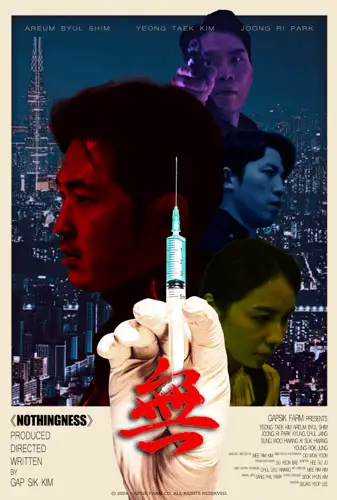
From South Korea, Gap Sik Kim takes a very indie approach to a sci-fi thriller, Nothingness, that may or may not be a commentary on current political and cultural issues. The year is 202X, and the government has teamed up with the big pharma corporation Babel to enact the “Violent Activities Prevention Act.” Babel has developed a drug called “R-3” that, when taken, removes a person’s desire to commit violent acts. As a result, anyone that the government deems potentially violent has a choice to either take the drug or be exiled to an artificial city (AKA concentration camp) known as the “City of Dreams.”
Our tale starts with a man being unhunted down by a serial killer, Jong-ha Kim (Sung Woo Hwang), who recently escaped City of Dreams. Detective Yeong-Il (Yeog Taek Kim) is hired by Babel executive Ronald (Joong Ri Park) to investigate the murder and track down the killer.
Things get complicated quickly as the killer, Jong-ha, was a former partner of Yeong-Il. Both men were deemed violent, and while Yeong-Il pledged to take R-3, Jong-ha didn’t and was sent to the City of Dreams. Further complicating Yeong-Il’s life, his girlfriend, Yeon Jung (Areum Byul Sim), was involved with Jong-ha, and Yeong-Il lied to save her from exile as well.
As Yeong-Il gets close to finding Jong-ha, a corporate conspiracy begins to unravel that has deadly ramifications on not only the current peace the country is experiencing but also on those locked up at the City of Dreams.

“…a drug called ‘R-3’ that, when taken, removes a person’s desire to commit violent acts.”
The first thing you’ll notice about Nothingness is that it’s a low-budget indie film using guerilla filmmaking tactics to tell its story. The fact that it comes from South Korea is a bonus.
Nothingness falls squarely in the neo-noir genre, with lead characters narrating as they walk down the empty streets. The tone and visuals are dark as the story takes place at night. Of course, there’s the slow reveal of a grand conspiracy.
The film lacks a lot of polish compared to the big-budget productions we’ve seen coming out of Korea. On the negative, the sound is lacking. The same goes for its lighting, which is almost exclusively natural lighting. The film is shot exclusively at night, which makes seeing scenes even more difficult. To the film’s credit, the dark lighting is not much of a hindrance. My last issue is the editing. It’s a bit choppy as characters sometimes appear out of nowhere after a sharp cut, which sometimes works against Yeong-Il’s hallucinations.
On the upside, the 80s synth soundtrack is amazing. The film feels like the low-budget sci-fi and crime thrillers from the techno-music era. There’s an Albert Pyun-vibe to Nothingness that I am personally nostalgic for today. I also love how Gap Sik Kim just goes out into the street to get the shot and then runs off to the next—guerilla filmmaking at its best.
What I like about science-fiction is taking a fantastic premise and saying something about the broader picture and humanity through the medium. When watching Nothingness, it’s hard for me not to think about the COVID lockdowns and vaccine mandates (NOTE: This Covid correlation is my opinion and may not reflect the filmmaker’s opinions). But the film explores this idea of freedom versus safety. How much freedom are you willing to give up for the sake of the government keeping you safe?
In the end, Nothingness goes for the sci-fi narrative and mostly succeeds. As a film, it’s far from perfect, but it has that indie vibe pulsing throughout. I’ll say it again. The more movies you make, the better it becomes. At the indie level, it’s about making significant tweaks the next time.
For screening information, visit the Nothingness official website.

"…taking a cool premise and saying something about the broader picture and humanity through the medium."

